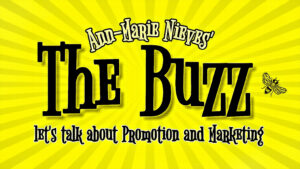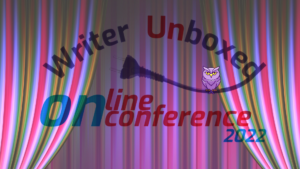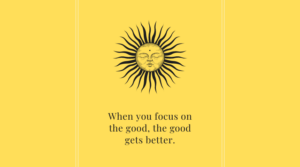Digital
I have some homework for you.
For 2025, I want you to really think about two things: connection and purpose.
Try to…
Consider how you will…
Describe yourself…
Describe your writing…
What influences your work…
What do you want readers…
Answer this question honestly…
If you have questions, you can always email me – am@getredpr.com – or drop a comment below. Wishing Writer Unboxed readers a very happy and healthy holiday season.
Read MoreBy Ann-Marie Nieves with Randy Susan Meyers
Today’s post by Ann-Marie Nieves of Get Red PR features her perspective on marketing and the opinions of Randy Susan Meyers, her friend and client.
Will it be dueling points of view or simpatico? Read on to find out.
We are all marketers.
I know you don’t believe me. I know it feels safer to say, I can’t do this because I’m not a marketer.
You can continue to say…
I can’t.
I won’t.
I’m not.
It’s my publicist/marketer/publisher’s job.
But it’s your story. It’s your brand. So it’s your job too.
And letting the value of marketing rest solely on someone else’s shoulders is not enough to sustain you.
This advice isn’t exclusively about accepting that you need to get involved with spreading the word; I’m not saying get over it.
I’m asking you to open your arms wide and embrace your compelling story.
A few weeks ago, author Randy Susan Meyers wrote about choosing joy in marketing. Here’s how she fully embraced her story:
From Randy:
Years ago, I heard the words that guided my career regarding (for me) the most vexing and challenging part of publishing a book—marketing and publicity:
Wisdom from literary agent Sorche Fairbank, speaking at a writer’s conference, became my mantra when facing the after-the-writing part.
Nobody will care about your book as much as you—not your agent, editor, husband, wife, mother, or father.
Nobody.
My literary agent, Stephanie Abou, became my other source of wisdom on taking responsibility for spreading the word—how to do what my publicist and marketing folks could not.
She urged me to, starting that day, move beyond relying on my writer circle and spread the word among friends (from past and present), family, alumni from any school I’d ever attended, camps, and houses of worship. Please do not rely solely on folks you are on contact with on social media.
I pretended I was throwing the largest giant wedding, bar mitzvah, and christening and prepared the most extensive guest list in history.
I even included old boyfriends. Hey, everyone’s curious about their exes, right?
Trusting my agent, I moved beyond my natural inclination towards quiet privacy and tracked down email and physical addresses. I designed postcards, wrote emails, and crafted a message that (I hope!) shared my news with a ‘letting you know’ tone that I might use to share any fun, good news. (I’m getting married! I became a grandma! I joined Habitat for Humanity!).
People responded with warm excitement. Nobody scolded me.
Okay, that’s a lie. One FB alumni group member scolded, “This isn’t the place for selling things.”
But he was always a jerk.
There are miraculous things only publicists can manage and things they can never do—and vice versa.
Now, with my sixth novel releasing (The Many Mothers […]
Read MoreBy Randy Susan Meyers with Ann-Marie Nieves
Today’s post by Randy Susan Meyers features not only her perspective on writers facing promotion, but also the opinions of Ann-Marie Nieves of Get Red PR, her friend and publicist—the person who keeps Randy from repeatedly hitting the wine bottle until the launch is over.
Will it be dueling points of view or simpatico? Read on to find out.
There is a subset of writers for whom promotion and marketing come naturally—men and women who get and enjoy the many sides of promotion. Come launch day, they leap from bed, put on their (bright red!) lipstick, shrug a perfect blazer on their sharp shoulders, flick their perfectly cut hair over their collar, smile wide, and greet the readers of the world with joy.
Then there are the rest of us.
We slouch towards book release day with equal amounts of dread and fear. If we’re lucky (and smartish), we’ve read Naked at the Podium, a must-have guide for readers. (“This practical book of tips, solutions, and exercises was born of a writer’s angst: how to present material in a way that was appealing to bookstore audiences, flexible enough to use in non-traditional venues, and dramatic enough to keep any audience awake and eager to buy.”)
If we’re massively unlucky, we live in the killer zone of denial and decide that winging a launch will be fine. At least our wrinkled shirt is clean!
And hey, didn’t we put our book up on social media? Over and over and over?
Can you choose joy in marketing? Is that even possible?
Sometimes it is possible to find joy in marketing, but I’m using my definition of joy:
noun
She felt the joy watching the cat chase a laser pointer.
Synonyms: absorbing
For instance, writing this piece thoroughly absorbs me, even if I’m not jumping for joy. This work nourishes me. Self-engagement is what I want marketing my novel to bring. Absorption. Interest. Cause if I’m bored with what I’m doing, there’s a good chance so-too will be my potential reader.
What authors do is usually different from the marketing and publicity work done by our publicists and marketing people, whether they be from inside our publisher’s domain or outside professionals. They are professionals and know their business.
The marketing we do—think social media, events, emails, author newsletters, walking the streets with a sandwich board—that’s the part that can destroy our souls if we’re not careful—or can work against our intentions.
We want readers to know we’ve written a book. (Because they’re readers—and books are what they want.) But we don’t want them rolling their eyes (see above me-me-me)—we want to tempt them to hunt down our books. Thus, consider these tips:
You Don’t Have to Do Every Single Kind of Social Media
In truth, unless you do them in an authentic and semi-enjoyable way, you don’t have to participate in any. One could make social media a full-time job between Instagram, Facebook, Threads, X (formerly known as Twitter), BlueSky, and TikTok. How do you choose which to […]
Read MoreI had Covid for Christmas. First time. I spent the holiday week quarantining in my basement and binge-watching The Morning Show. I was pissed. My husband was overwhelmed. Our kids were sad. Our hound watched over me figuring something was very wrong if we weren’t going out for our daily two-mile walk. January couldn’t come soon enough.
January 2024 has been the most meaningful month I’ve experienced in some time. Don’t get me wrong, Covid has left me with lingering headaches, brain fog (I write down everything and say it out loud), and an almost desperate need to drink Diet Coke at 3pm daily (not a custom habit for me). Ironically, Covid also gave me a chance to reset after an obnoxiously busy autumn.
So here’s what’s on my mind for 2024.
Consider your asks (I’m saying this nicely)
Many of you likely heard the news about author J.D. Barker’s booktok campaign to get influencers – mostly young females – to cover their private parts with his new book. There were other sexually charged asks, but this is the gist. As a publicist whose client came forward about Bill Cosby, I don’t take this behavior lightly.
Are marketers, publicists, and authors getting so desperate for a leg up that we’re pushing out predatory campaigns that objectify the very people who breathe life into our book community?
Shout-out to the influencers who came forward about this and publicly shamed this author and his campaign. Continue to lift our community as you do.
When I worked for PR firms in my twenties and early thirties, no campaign was implemented without the heads and the clients signing off. Our pitches were vetted and vetted again. Our bosses sometimes stood over our shoulders as we smiled and dialed to hear what we were selling to the media. As anxiety-inducing as those days were, I’m thankful for those lessons of strategy, preparation, control, and protection.
When they go low, we go high
I like Goodreads for what it could be. And thank goodness the company is finally addressing its review-bombing issue. We also need to address our behaviors on platforms like Goodreads. Aspiring writer Cait Corrain upended her career after she admitted to writing fake reviews that praised her forthcoming novel and blasted fellow authors in her genre. Please remember there is power in your review. And please remember that bullies never win.
How do you measure success?
Greer Macallister said the following in her recent WU post, “Whatever stage of your publishing career you’re in and whatever path you’re taking, I urge you to figure out your own definition of success.”
I think of standing still quotes… be afraid of standing still…if you’re not moving, you’re standing still.
One of the things I’ve experienced with clients in the past is this belief that they should get the same press, retailer promotions, signings, book clubs for every single book.
But the story is not the same. The month or year is different. The landscape has changed. Not only do you need to figure out your definition of success, but you also need to get comfortable with the fact that the definition should change.
Be a student
There are […]
Read MoreIf you’re a writer who’s serious about a career, you probably have some form of online presence: a website, a blog, an Instagram account. You may make use of images and/or videos created by others–to add visual interest to your blog posts or newsletters, build out your website, and engage your readers and followers. For example, the header image I’ve placed at the top of this post.
Online image use is not without its dangers, however. It offers fertile ground for copyright trolls.
What’s a Copyright Troll?
Wikipedia defines a copyright troll thus:
A copyright troll is a party (person or company) that enforces copyrights it owns for purposes of making money through strategic litigation, in a manner considered unduly aggressive or opportunistic[.]
These kinds of copyright trolls create and register copyright to content that they then make widely available online, to increase the possibility that people will re-post it without permission. Using sophisticated search tools and algorithms, they find infringers and use threats of litigation to shake them down for cash settlements.
More indirectly, some companies and law firms specialize in copyright threats on behalf of third parties, seeking out infringers (and often roping in non-infringers as well), filing or threatening to file suit, and demanding large fees (in many cases, far exceeding the actual value of the intellectual property) to close the claim.
A major pioneer of third-party copyright trolling was a company called Righthaven, which licensed rights to news articles and then used the threat of lawsuits to coerce people who posted the articles—or even snippets of them—into paying thousands of dollars in settlements. Another notorious practitioner was former lawyer Richard Liebowitz, who employed a similar M.O. on behalf of photographers.
Karma did eventually bite back: Righthaven was sued out of existence, and Liebowitz was suspended from the practice of law in New York State. But copyright trolling is alive and well, and if you post images online, you may become a target—as I did a few months ago.
My CopyTrack Adventure
Like many people favored with attention from copyright trolls, I was a bit freaked out when I received an email from CopyTrack, an “expert for the global enforcement of image rights” that’s widely enough known in trolldom that there are explainers addressing what to do if they contact you.
You can see the image and how I’ve used it here. (Note that this is my personal website; I’ve used the same image on the Writer Beware blog, but copyright trolls prefer to focus on individuals, who are less likely to have the resources to defend themselves.)
Because of Writer Beware, I’m often targeted with various kinds of threats. Mostly these can be safely ignored. But though I’d never heard of CopyTrack, I had heard of copyright trolling, and the general consensus is that non-response is not a good idea.
The link in the email above leads to the CopyTrack Settlement Portal, and a form where I was asked if I had a valid license to use the image. Here’s another feature of copyright trolls: they don’t do a lot of due diligence before sending […]
Read MoreIf you ever have a marketing and PR question, feel free to email me – am@getredpr.com – or drop a comment in the Writer Unboxed Facebook Group and tag me @Ann-Marie Nieves. I’ll do my best to answer in future posts. This question was posed by Leslie Budewitz last week and it’s a great one. Let’s unpack.
When this article, The Ten Awful Truths About Publishing by Steve Piersanti of Berrett-Koehler Publishers, landed in my inbox, I breathed a deep sigh of relief. Warning: It’s a positively frightening read that will make you want to hide underneath your covers… or hurl a glass across the room. If there is bourbon in that glass, down it quickly, read the article, and then throw the glass across the room.
So why did I breathe a sigh of relief?
Because someone else far more important than me said it – all the things I’ve been thinking, saying, that have made me change the way I work. A publisher said the things. The things about the many, many books on the market; how they sell or don’t; and the constant change due to disruptors (TikTok) and disruptions (supply chain issues).
So now we know about The 10 Awful Truths about Book Publishing. And now we understand that we have to think differently, reset expectations, and get to work. But first, we take inventory:
What’s the key takeaway for you in Steve Piersanti’s article? Are you ready to take inventory? What are […]
Read MoreLast week I sent out a few extra emails. Emails that read:
-I’ve been meaning to congratulate you on xxx.
-How are you holding up – I know you’ve had a rough go and I just want you to know I’m thinking of you.
-I just want to say thanks for your referrals and your wisdom.
-You’ve been in my head and I just wanted to say hi.
The weeks go by so quickly. The days are filled with meetings, deliverables, and requests. Sometimes, we just can’t help but put etiquette aside. But it’s never too late to show gratitude and kindness.
Now, let’s answer some PR and Marketing questions…
So you’re interested in hiring a publicist? Here are some of the common questions I get asked during the discussion phase:
Do you work on commission or for royalties? This is a big no for most seasoned publicists. The math on royalties just doesn’t work. Despite the outcome of any campaign, PR pros put in significant hours, and a good number of us respond to client needs well outside of standard business hours and days of the week. The bottom line is don’t ask anyone to work for free. What you do want to ask is how the fee structure works: Is it a monthly retainer or a project fee and for how long?
Can you only focus on getting me only national press? I’m certain many publicists will say yes to this and in a previous year, I might have said sure too, but the answer to this question today is sorry, that just won’t work for me or for you. A publicist worth her salt is going to ask you what your goals are and where you would like to see yourself. And then she’s going to tell you where else you can and should be because she’s prepared to slice and dice your story for numerous audiences. I’ve found that a good majority of folks in the market for a publicist have little idea about the media out there – the magazines still in circulation, the outlets that have a books focus, those websites that have the best books roundups. And because national media is the hardest get, your campaign may not meet expectations.
I’ve written some articles, can you try and get them placed? I’m happy to take a look at what you’ve written and discuss your goals for placement. But I really want the client to come to me having done his research as to the possibilities. Too often I’m told to go after high-circulation magazines that are either no longer in print, not open to submissions, or whose content isn’t the right fit. When this happens, I will counter with some outlets that I believe could work.
Read MoreOne of the comments on my last post in which I asked writers if they liked their online persona, suggested the following:
“I would like to suggest a follow-up post you might consider. This one would be for older writers like me. They grew up without online anything, but in a time when values and standards related to the written word took precedence for anyone who wanted to be a writer. They still have something to say (even to younger readers), and know how to say it, but are lost in cyberspace.
What guidance or advice could you give to such writers? You run a successful PR company, and some writers with deep pockets might be able to do business with you. But what about others with some money, but limited resources? If the writing itself is what still matters, older writers need someone like you to point the way through the minefield. Otherwise, we will be silenced before our time.” – Barry Knister
Dear Lost in Cyberspace,
A good percentage of my client base is above 60. I’ve launched books by authors who have published for the first time at 80-something. To say I adore writers of retirement age would be an understatement. Why? They listen carefully. They are present. They show considerable patience. They value time. They respect the outcome even if it’s not the desired outcome.
The other night I took my daughter to the Jingle Ball concert at Madison Square Garden sponsored by iHeartRadio and Z100-FM. The crowd was rabid with pop music fans in glowing reindeer headgear and bright bulb necklaces. The evening was fantastic, but what I remember the most is singer/songwriter Charlie Puth saying the following, and I paraphrase…It’s great to see my songs on TikTok remixed by so many, but nothing beats this. His hand pans over the crowd of thousands that he just sang his heart out to. And man can he sing.
My advice to you Barry:
Tell your story.
After you’ve found the editor of your local paper, email them your pitch or snail mail a copy of your book with a copy of the pitch. Remember to say what town you live in. If you don’t hear back, send another email a few weeks later.
Go beyond local to your regional daily and magazine. Some communities even have local cable access programs and news and lifestyle websites that you can pitch.
If you’re considering self-publishing and wanting to maximize potential income, do yourself a favor and take a peek at Amazon’s Kindle Vella platform.
If you haven’t already heard about Kindle Vella, it’s a place where you can serialize your novel over an extended period, instead of publishing one whole story all at once. Instead of chapters, you are publishing “episodes,” much like a television series.
This isn’t a new concept. Serialized novels first popped up as early as the 17th century and really took off in England during the 19th century when novels were published episodically in newspapers and magazines.
This allowed poorer overworked readers to enjoy stories that would have been too expensive for them to read as leather-bound volumes. In the modern era, Kindle Vella readers are reading on their phones, often during short breaks in their busy days, like while standing in line at the DMV or waiting in the carpool lane.
There was (and still is) a benefit to authors for writing serially. Many unknown 19th century authors were able to establish an audience and grow in popularity by first publishing in serialized format, including but not limited to Charles Dickens, George Eliot, Thomas Hardy, and Robert Louis Stevenson. Many modern-day authors are having similar success, building their fan bases through Kindle Vella. Why couldn’t this be you?
In a nutshell. The first three episodes of every Kindle Vella story are free to readers. After which, readers must redeem tokens to unlock future episodes. The number of tokens it takes to unlock an episode corresponds to the length of the episode. For example it takes 6 tokens to unlock an episode that is in the 600-699 word length. It takes 12 tokens to unlock and episode that is 1200-1299 words in length.
Readers can buy tokens in bundles of 200 ($1.99), 525 ($4.99), 1100 ($9.99), or 1700 ($14.99).
As they read, readers can give feedback such as marking your story as a “favorite” or giving an episode a “thumbs up.” This feedback will affect your bonus. More on that later.
How to get started. It is ridiculously easy to set up an author account. If you do not already have an Amazon account, start there. Once you have an Amazon account, access Kindle Direct Publishing (KDP). Once you sign in to KDP, access the “Kindle Vella Library.”
After that, KDP will take you through the step-by-step process of entering your name/pen name, the title of your story, the genre, and the key words.
As for the cover image, you don’t have to pay for an expensive book cover. Traditional book covers aren’t even allowed. Instead, choose a simple image with no words on it that conveys the tone, theme, and genre of your story. You can find many images for free online. For example, explore Canva. The dimensions of a Kindle Vella cover image should be 1600 x 1600 px.
Here are some examples of cover images from Kindle Vella (the platform will make your square image round):
Writing the Perfect Episode. Kindle Vella allows episodes to be anywhere from 600-5000 words; however, there does seem to be a “sweet spot” with readers. Because they’re often reading on their phones to […]
Read MoreIn September of this year, a strange and wonderful new force was unleashed on the world: an online conference for the Writer Unboxed audience. Aptly named OnConference (or OnCon for short), the event did a tremendous job of capturing within an entirely virtual environment the unique aspects of the amazing UnConference (UnCon) events that WU has become known for, which rank among the absolute best conferences I’ve ever attended or participated in.
WU Editorial Director and co-founder Therese Walsh and her awesome staff worked long and hard to plan, prepare and host this event, which had major similarities to previous UnCons, as well as some key differences.
Starting with the differences: The entire event was held online, with no in-person interaction. Another significant difference was the timing and duration. Instead of four or five days jam-packed with back-to-back (and frequently overlapping) sessions, OnCon was spread out over several weeks, and relegated to certain times of day, with the goal of allowing attendees to fit the conference in around their busy lives. And a key advantage of the online format was that it allowed for replay recordings to be posted, for those who were unable to attend a session in real time. For the session leaders, a welcome new aspect of this scheduling approach was that there were no simultaneous sessions, so nobody was competing against other presenters for an audience. (As a guy who’s been unlucky enough to have one of his sessions scheduled against a Donald Maass session at the last UnCon, I can tell you that this new approach was a HUGE relief!)
Obviously, the online setting made it impossible to enable the same in-person mingling and socializing that organically occurs in an onsite setting such as the Hawthorne Hotel in Salem (the site of previous UnCon events). But Therese and team did a terrific job of providing a welcoming online environment, complete with a “lobby” and plenty of virtual “tables” where attendees and session leaders could gather and chat—while able to see and hear each other via live-streamed Zoom-like video. Also available was a chat function, at both an event-wide and individual session and table level, along with the ability to send private messages to attendees and session leaders.
On October 18, the 2022 OnCon wrapped up its sessions, with a dual launch party for the new books from WU mainstays Barbara Linn Probst and Vaughn Roycroft, as well as something called an Owl-Off. (No, that’s not prison slang. More on the owls soon.) But early survey results are confirming my own assessment of the event as an unqualified success, with the vast majority of responses rating the event as “Excellent.”
No. Please don’t say it like that. Just… no.
Despite how well the event went, those of us behind the scenes know that what attendees experienced was the result of a long—and sometimes bumpy—journey.
The search is on
First came the challenge of HOW to do an online version of UnCon. This was definitely a “many are called, but few are chosen” scenario. Therese and her valiant crew of testers, led by hirsutely handsome hubby and all-around technical guru Sean Walsh, tried on multiple […]
Read MoreSerial reading/writing platforms and apps aren’t new. Wattpad is probably the best known; others include Radish, Webnovel, and Kindle Vella.
In the past couple of years, though, there’s been major proliferation in the serial reading/writing space, with multiple companies launching mobile apps: Goodnovel, NovelCat, SofaNovel, FameInk, Hinovel, NovelPotato, Novelstar, Fizzo, just to name a few.
Based primarily in Singapore, Hong Kong, and mainland China, these apps host enormous numbers of mostly English-language serialized novels in almost every genre you’ve heard of (and some you haven’t). Novels are published chapter by chapter, with the first few available for free and readers buying “coins” or tokens to unlock the rest.
What’s the appeal for writers? Monetization. Benefits include a share of reader-generated revenue, along with a variety of one-time or repeating cash payments (for instance, Novelbee offers a signing bonus, an updating bonus, a completion bonus, a renewal bonus, and an advance/buyout payment). And it’s not just about the money. The apps also hold out the promise of exposure, reader feedback, promotional support, and guidance from editors. “We Nourish New Shining Stars,” Hinovel promises.
Despite publishing almost entirely in English (and featuring mostly white European faces on book covers), the apps recruit internationally. Novelcat, for example, describes its Writer Benefits in Bahasa Indonesia, Vietnamese, Hindi, Tagalog, Portuguese, French, German, and Spanish in addition to English. Editors, aka recruiters, who look to sign completed and previously published books as well as works yet to be written, employ aggressive tactics, including soliciting writers on Wattpad, messaging them on Facebook, inviting submissions in writers’ groups, and emailing out of the blue. If you’ve self-published, or published with a small press, you may hear—or may already have heard—from a serial reading/writing app.
So why do the apps loom large on Writer Beware’s radar?
UNPACKING THE PROMISES
What’s not always completely clear in recruitment ads and emails, or on the apps’ websites, is how conditional many of the “writer benefits” are.
The full range of financial rewards, for instance, may only be available for exclusive contracts, with many of the income options off the table for non-exclusive agreements. Benefits may be further restricted by limited availability (you may only be able to claim monthly update bonuses twice, for example) or by requiring grueling benchmarks in order to claim them (producing 60,000 words or more monthly, being “absent” no more than two days per month). As for a share of reader income, that may only be available for books that are designated as “premium content”—something that’s entirely at the apps’ discretion, and is not necessarily guaranteed.
Many apps promise editorial guidance–but the people functioning as editors are recruited in the same way as authors, and remuneration isn’t exactly princely. iStory, for example, provides editors with a small monthly cash payment plus a 10% share of reader revenue from the authors they sign, but they get paid only if they fulfill recruitment quotas. I can’t see a lot of credentialed professionals signing on for that. (I’ve gotten reports from a number of writers who’ve had poor editorial experiences, including being berated for for not posting enough content, being pressured to insert erotic content into their […]
Read MoreFor my last post in April 2022 I asked a few authors at different stages in their careers, what did they learn about book marketing and PR which was surprising. The feedback I received from writers was that these little nuggets of book marketing communications wisdom really hit home. So, I’m at it again with advice from five savvy authors.
The Differences Between PR and Marketing
“I think I didn’t realize at first that book marketing and PR were two completely different entities! In the beginning, before someone explained it to me, I thought PR and marketing were all the same thing. believing it all came under the umbrella of any kind of exposure for your book. It wasn’t until a dear friend explained that marketing “cost the publisher money” to ensure a novel was “seen” by potential readers with promotions like advertisements and blog tours, did I fully understand it was something that was guaranteed because it was paid for by the publisher. –Alyson Richman is the USA Today bestselling and #1 international bestselling author of several historical novels including The Secret of Clouds and the forthcoming The Thread Collectors with Shaunna Edwards.
A Holistic Approach
I originally thought that the objective of marketing and PR was to get my book sold. Period. What I’ve learned is that marketing and publicity create channels to reach readers via influencers, podcasters, bloggers, traditional media, etc., who then serve as conduits directly to readers. The more channels you employ to draw attention to your book, the better because this is an extremely competitive industry in terms of getting your pages onto the eyes of readers. It’s also imperative to collaborate on the marketing and publicity of your book and to not assume you can sit back and let your publicist and/or marketing professional do all the work. Yes, they understand the business of pitching and positioning your book. But, you know your story better than anyone, so when you have an idea or an angle that you feel can influence readership, go with it. Or, at least, run it by your publicist; she’s a wonderful resource.-Eileen Brill has written professionally for the restaurant, hotel, and commercial real estate industries. A Letter in the Wall is her first novel.
PUBLICITY BASICS 101: Get to Know Your Publicist
Okay, so you have been working with your wonderful editor on this precious book of yours for a long, long, long time. You feel that you now know your editor as well as you know your husband or parents or child and your editor most likely feels the same way about you.
But what do you know about your publicist?
Most likely she or he is a total blank in your mind. So although I’m saying get to know your publicist, you really want them to get to know you in a way that your editor might not know you— or at least they don’t know what you feel is important about your book in terms of connecting with the marketplace. A slight footnote here: Editors don’t really like the word ‘market’ or market place—it’s too coarse for them I’ve discovered. Too transactional, etc. The vulgarity of the terms […]
Read More
Credit: Canva
Several years ago in a campaign wrap-up call for an author’s first self-published book (she had a few books with big houses in previous years), she commented to me that she was disappointed by the lack of blogger reviews I had gotten for her novel. Fair enough – most of the bloggers that had covered her in the past either hadn’t responded to my outreach, expressed that they had too much on their plate, or were nowhere to be found. When a book is self-published, publicists often receive a different response from media and influencers, so the quiet didn’t weigh on me heavily. When I told my client we had secured and paid for a BookBub deal that lead to more than 27k downloads and dozens of favorable Amazon reviews in just a week’s period of time, creating a halo-effect for her previous works and introducing thousands of new readers to her work, she said nothing except to ask what was BookBub was. (It was in our proposal and letter of agreement.) Some months later, I heard she had gotten an offer from one of Amazon’s publishing imprints for that very same book. Bravo!
Let’s break this apart.
-We were at a turning point in the blogging world. The reason for my poor showing on the blogger front was perhaps less about me doing the work and more about the fact that bloggers weren’t doing so much blogging anymore. Hello #bookstagram
-BookBub was founded in 2012. Think about when you first started using this influential platform. For any author that has gotten a BookBub deal – how thrilled were you?
-Amazon started its publishing arm in 2009 and launched several imprints in its first two years. And that was over a decade ago. I love the idea of more authors having a shot at living their dreams, but what does it mean for PR?
This morning I was listening to David Bowie’s song CHANGES. I love Bowie–the oddity, the wandering, the uniqueness, the fact that he was always ahead of the time, THE CHANGES.
Here in book world, you may have noticed some of the changes–popular books out of stock, less attendance at Zoom events, publishers not wanting authors to do virtual bookstore events, delayed shipments, authors creating their own platforms on social media, lots of Instagram Live programming, less reviews, not much differentiation of books in media coverage.
As we head deeper into 2022, here’s are some things to consider about PR and marketing. As usual, I had a little help from my friends in the biz.
M.J. Rose, Founder of Authorbuzz; Co-founder Blue Box Press; Bestselling novelist (current book out is The Fashion Orphans with Randy Susan Meyers)
We are finding with so many more books being released than ever before, one of the most important new developments is that the book’s Amazon page is more important than it ever has been.
There’s a limited amount of information any marketing can impart. Ads interest people in the book but what sells the book is the book description and reader reviews and excerpt on the Amazon page.
So what is key? The book description needs to help the reader know quickly if the book is for them or […]
Read More














